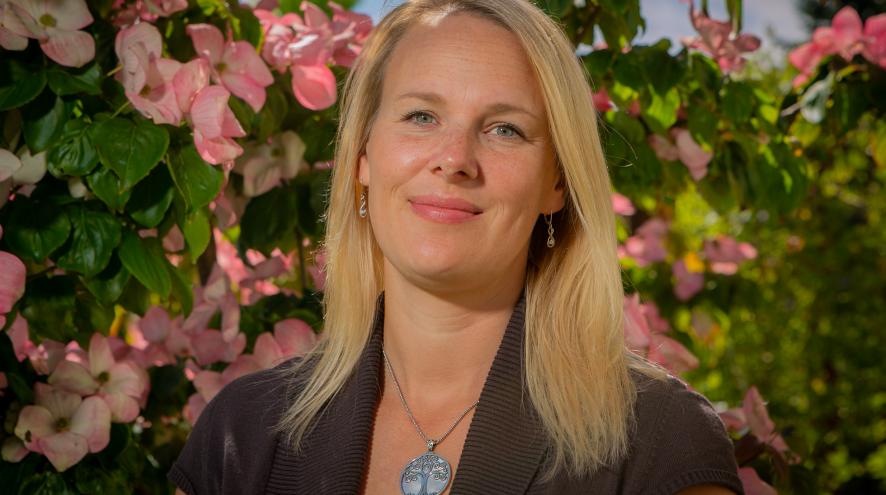Dementia in the days of COVID-19: A long-term care providers’ perspective
Erin Beaudoin is the Chief Motivator, CEO of Eden Gardens, a non-profit long-term care home community in Nanaimo that provides person-centred care for people living with dementia. Erin has been outspoken about the impact COVID-19 had on Eden Gardens’ community members, including staff, residents and families. She joined us to reflect on the impact the pandemic has had on her community and decisions she made in leading the organization through such an incredibly difficult time.

The following is a feature story based on a longer interview with Erin, that can be found here.
Community comes together in crisis
When Erin Beaudoin talks about all the ways people in Nanaimo came together to show people living with dementia at Eden Gardens that they weren’t alone during the pandemic, it’s like watching a highlights reel of feel-good community news stories. Ballerinas danced outside windows. Musicians played saxophones, trumpets and guitars. A car show. A motorcycle brigade. Youth 2020, a volunteer group, painted four-foot-tall wooden kids and put them around the property, so when residents were out, they were reminded of the kids wo weren’t able to see them. At the outset of the pandemic, local hotels donated sheets and volunteers came together to sew 600 gowns and masks as emergency PPE.
“We’ve had some really beautiful moments,” Erin says.
With the generosity and words of encouragement from the community came hope, confidence, love and joy during such a difficult time. The impact of this support was immense, yet it did not outweigh the struggle of life during COVID-19. The once-vibrant community – home to visitors, pets, students, volunteers and celebrations for every holiday – has come out of its darkest days of COVID-19, but the wounds the pandemic left behind will take much longer to heal, Beaudoin says.
The struggle ensued
“The staff really were dedicated to doing everything they could and more to try and maintain life as much as possible, but as staff started to burn out, that became more and more difficult,” she says. “It got quiet, then it started to get lonely and depressing for everybody. Our staff workload is hard and without our volunteers and families, the workload massively increased.”
Then residents who relied on facial expressions to communicate stopped communicating. Responsive behaviours increased. Families wanted important updates that staff often weren’t able to provide. All families were hearing was bad news.
“When we stopped seeing the joy, it got tough to remember our mission, what we’re here to do and the benefits of this honourable line of work,” she says.
Residents and staff went through traumatic experiences with violating COVID test swabs, 14 days of isolating during an outbreak in February and a first round of vaccinations from public health staff who needed more support. It was tense. The second round of swabbing and vaccinations was much improved by collaborating with the public health team on better understanding the needs of people living with dementia.
Acceptance
As the pandemic wore on, Erin aimed to educate herself on vulnerable leadership during difficult times. But the resiliency workshops made the situation worse.
“They preached balance and balance wasn’t an option,” Erin says. “I came to a point of just accepting that I couldn’t be balanced and forgave myself.”
With that acceptance comes the open acknowledgement of mistakes she made at the helm of the organization. While there is always something else to do – from reviewing public health orders or the latest changes to collective agreements – she urges other leaders to ensure they make the time to do rounds. If she could go back, she would opt to spend more time with the people who do the work that keeps residents alive and well.
Health-care providers, families and people who have spent the pandemic inside care homes are left to replay incredibly challenging situations and scenes of loss. For Erin, it’s the people left separated from their parents until just hours before their passing, the crying kids unable to say final goodbyes to dying grandparents – and those people who died living with dementia and unable to feel the love if their families in the room next to them. Those are the losses we won’t soon recover from.
“People died of broken hearts,” she says. “We almost incarcerated a very vulnerable population of our society with the very best of intentions and it did some serious damage.”
Since the spring, amid loosening COVID-19 restrictions, more visitors have been welcomed inside Eden Gardens. The once-locked down home is starting to see the return of the spirit in the halls. It’s a slow recovery process, and one Erin, residents and the community are grateful has begun.
